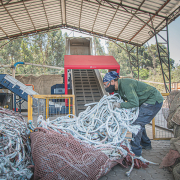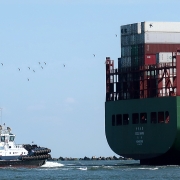Battle for Legally Binding Agreements to Manage Global Plastic Production
Recyclers around the world are concerned regarding the inefficient progress on a Global Plastics Treaty being promoted by the United Nations. Discussion on the treaty at the Singapore Convention of the Bureau of International Recycling heard complaints that “low ambition” countries were delaying agreement on a legally binding instrument and that petrochemical plastics producers are lobbying to be exempt from measures considering the full life cycle of plastics.
Olivier François, the International Environment Council Chairman and Market Development Officer for Galloo (FRA/BEL) dedicated the entire session on 28 October to the treaty. It began with BIR Trade and Environment Director Alev Somer setting out the scale of the growing gap between plastic production and the capacity of waste managers and recyclers to process it – hence the need for a global, legally binding treaty. Negotiations started in 2022 and five sessions were planned, with the final one due in Busan, South Korea in November and a hoped-for signing in mid-2025.
“It’s a bit ambitious, I would say, and not really realistic,” said Ms Somer. “We have basically only a compilation text which is definitely very far from the final treaty that we could have, and there are still many open questions, starting with whether this will be a voluntary agreement or a legally binding instrument. “The most contentious issue … revolves around defining the full life cycle of plastics and whether [the agreement] should include the primary producers. Basically, the primary producers are suggesting, if this is going to be a legally binding instrument, keep us out, we want to be exempted.”
BIR has aligned itself with those “high ambition” countries who do want a binding agreement and want the entire life cycle to be addressed, including the unsustainable production of primary plastic polymers. They also argue for a range of measures including mandatory recycled content targets, more eco-design, financial mechanisms and incentives, and restrictions on hazardous substances.
Praise for BIR
Fellow speaker Robin Wiener, President of the US-based ReMA (Recycled Materials Association), praised BIR for its leadership in representing the global recycling industry in the negotiations. She was pleased that the scale of the plastic problem was not being put at the door of recyclers for not doing their job. “There’s a recognition that recycling is part of the solution but is not the only solution. That’s a great step forward.”
However, whilst being generally supportive of the approach, ReMA was “still very much trying to figure out where we are in this process”. Ms Wiener stressed their concern about the potential unintentional consequences or impacts that such a production cap could have, because it could inadvertently reduce the demand for recycled plastic.
ReMA had three other concerns, she added. One would be any sort of barrier to trade in the global marketplace. Another was the need for any Extended Producer Responsibility (EPR) provisions not to restrict in any way the existing recycling infrastructure. “Really, the devil is in the details when it comes to EPR,” she said. The third concern was chemical recycling. “Let me be very clear that we’re all for innovation and recycling and chemical recycling. True, chemical recycling is an innovation for the hard to recycle plastics. But if you label waste management technologies and waste management processes as recycling, that’s not recycling. Definitions become incredibly important in the treaty, and that’s something we’re going to be watching out for.”
Treaty hopes
The third speaker, Sophie Sicard, Deputy Director for Sustainable Development and Public Affairs, France & Europe at PAPREC (FRA), was aligned with the others’ views and hoped some sort of treaty would result. “We must see it as a first step and work together for comprehensive progress.” She specifically agreed with Ms Wiener about the dangers of inappropriate EPR schemes becoming monopolies or competitors to recyclers.
Ms Sicard pointed out that the European Union had led the way with mandatory levels of recycled content in new plastic products and had banned the exports of plastic waste to non-OECD countries. But the current situation in Europe was a slump in demand and a “very, very strong slowdown in this dynamic sector” and investment cut. “Very, very innovative companies are closing down right now, and we also face an increase in imports of recycled plastics from abroad. We are at a very pivotal moment where Europe could lose this leadership in plastic recycling, just because it doesn’t work on the economic side of things.”
The Asian industrial perspective came from Max Craipeau, CEO of Greencore Resources Ltd (IDN) who said a treaty with legally binding requirements for recycled content would have “a fantastic positive impact” for the continent. “I’ve always been a big advocate of minimum recycled content and, to my view, this is the key without which plastic recycling will never enter at scale in the economy.”
During questions at the end of the session, Ms Somer said that, if the negotiations fall short of expectations, then at least the recyclers’ voice on the issues will have been heard by the 192 nations involved. “We should not see that as a failure but as a huge platform where we managed to actually voice the need for recycled content targets, whether they are harmonised or not. If they start to take up that initiative that will eventually drive the recycling market.”
Source: BIR (Brussels, October 31, 2024)








